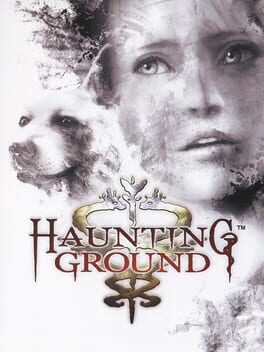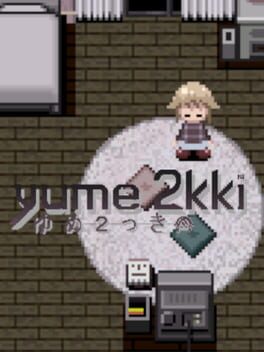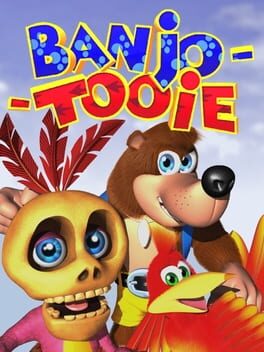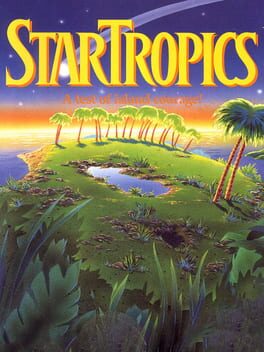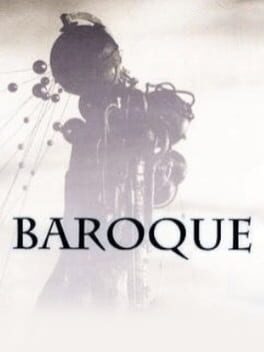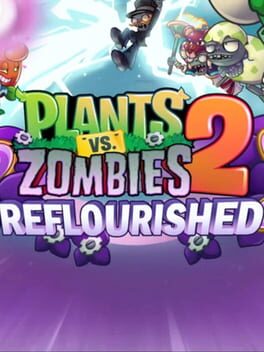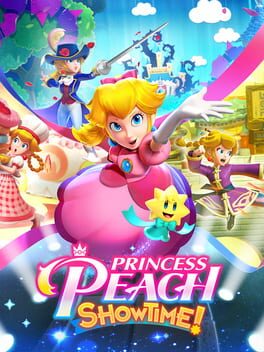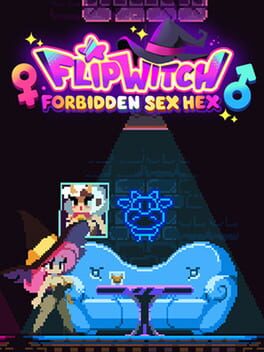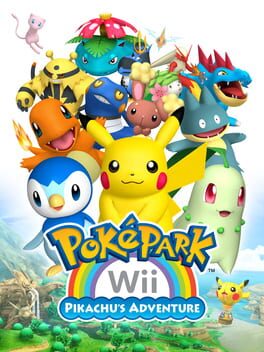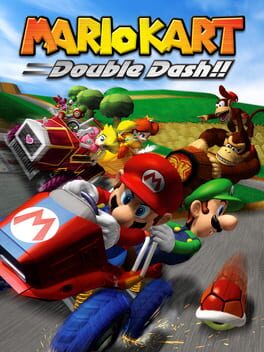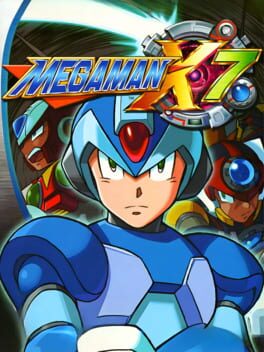MangoBat
302 Reviews liked by MangoBat
Haunting Ground
2005
A must play for people who consider themselves fans of the horror genre, as creative in it’s approach to the gameplay as it is terrifying, its a real test of mettle and how much you can handle, it tosses away conventional regular enemies to instead focus on a posse of stalker enemies who chase you around as you try to desperately advance through various levels, speaking of those, it’s amazing the amount of interesting environment you can pack with such a simple setting, some later levels are just jaw-dropping in terms of atmosphere and detail. It’s a true spiritual successor to RE1, but you’re not playing a person capable of being able to shoot any threat that comes their away, quite the opposite in fact, Fiona can and will succumb to the stress placed upon her by enemies which leads to a variety of panicked states, she only has her wits and some piss poor attacks to maneuver or defend herself, the German Shepard she rescues, Hewie, does the real carrying but even then he can only temporarily stop enemies and not permanently incapacitate them, add to that the fact that the stalkers in this game don’t have a habit of giving up easily on chasing you and you have a great basis for some truly terrifying moment to moment gameplay.
Oh yeah, the story is also interesting and holds it’s own quite well, Fiona might not say much but her expressions show a sea of emotions, seriously the facial animations for the game are pretty fucking good and they add a lot to the cutscenes, one of the most terrific scenes is pretty dependent on em! As for other aspects I really like how an act of unwarranted kindness from Fiona, even in the depths of hell, is what ends up saving her, I think it’s a neat way to shine a light on an aspect of Fiona’s personality.
Oh yeah, the story is also interesting and holds it’s own quite well, Fiona might not say much but her expressions show a sea of emotions, seriously the facial animations for the game are pretty fucking good and they add a lot to the cutscenes, one of the most terrific scenes is pretty dependent on em! As for other aspects I really like how an act of unwarranted kindness from Fiona, even in the depths of hell, is what ends up saving her, I think it’s a neat way to shine a light on an aspect of Fiona’s personality.
Yume 2kki
2007
yume 2kki definitely has a different vibe from yume nikki, but i think it really works in its favor. i love the sort of eclectic vibe this game has going on, since every area is made by its own dev. it makes it really feel like a dream, not every dream is a perfectly laid out set of events that tells a story, sometimes just some wack ass shit happens and i love that. yume 2kki is awesome, and i can't recommend it enough. absolutely check this out
Yume 2kki
2007
Banjo-Tooie
2000
If this game wasn't INCREDIBLY racist it would still be my favorite game of all time. Just endless waterfalls of more and more one-off garbage to do, with wildly different locales, fun music, goofy gameplay and really silly writing. If I could go back in time I'd frankly kill whoever though Mumbo and Humba were good ideas and let the games be better forever.
StarTropics
1990
I know people love this and I appriciate the vibe and cool ideas it has but this game never managed to not frustrate me whenever I played it. I dread every single dungeon in this game and ask myself why I even turned it on.
The death screens you can't see coming made me break my legs because I didnt wanna break the NES controller because im hardware respector
The death screens you can't see coming made me break my legs because I didnt wanna break the NES controller because im hardware respector
Baroque
1998
You ever play something so ahead of its time that you could trick someone into believing that it just came out yesterday?
Seriously, what the fuck? 1998? I know Dungeon Hack existed for half a decade before this, and Wizardry a decade before that, but this feels advanced. Like, this might just be me speaking from ignorance, having not played the fifteen years of first-person dungeon crawlers building up to this, but there's something about the entire design philosophy of this that seems modern. Roguelikes weren't new at the time — you know, what with Rogue existing — nor were real-time blobbers, but combining them into one entity that encourages multiple playthroughs to peel back an obfuscated story is something that I last saw in The Binding of Isaac and in precisely zero games before that.
This game is impossibly cool. Let this be the most Hot Topic thing I ever say, but there's something about these hellish industrial land-and-soundscapes that make me feel a sense of belonging. Having a world that's in such an obvious, complete state of disrepair that you can't do much besides band together is a welcome reprieve from our world where everything is awful but the collective populace pretends as though it's fine. Comfort in discomfort; the end-times as impetus to make what's left over better. Of course, that isn't going to stop opportunists like Coffin Man from picking your corpse for loot, but it's not like he's gonna kill you for it, either.
It's a difficult title to discuss, and that's mostly due to how reliant it is on being experienced. This is probably a bit of a nothing statement, given that everything is designed to be experienced by someone, but the actual act of attempting to engage with the game feels more like "the gameplay" than its actual mechanics. Attempting to define this by putting it in neat boxes of clearing rooms and slashing up monsters and leveling up does a disservice to the whole. You cannot break this down into its parts without losing the magic that binds them all together.
I mentioned in my Last Call BBS review that I have a hard time with puzzle-solving because I can't really figure out how to learn how to solve them. With that said, though, brushing through Baroque's cryptic design came naturally to me. It's a game not just of learning, but of risk-management. You learn that Bones are items that can be thrown or consumed to deal enemies and apply buffs, respectively, but what do you do when you find an unidentified Bone on the floor? Do you gnaw on it and risk hurting yourself, or do you toss it at the enemy and risk giving them total invulnerability? When you find a new weapon, do you equip it right away to identify it, or do you avoid doing so because it might have an "adhesive" that makes it impossible to take off? These are basic tenets of Rogue games, but are they really different to puzzles in any meaningful way? You're meant to use your reasoning to figure out what the best course of action should be, and then following that path. Is that distinct from puzzle-solving?
I suppose what makes Baroque work for me is that there's never a binary right or wrong answer. There are good answers, and bad answers, but never right or wrong. Gnawing on a damaging bone will hurt you, but only for 10/20 HP (you start with 99). Stepping on a status pad might afflict you with Lust or Darkness, but only for a minute or two. The game can be harsh, but never unfair. You can never make a single mistake that'll cost you the run; you have to make several mistakes in sequence before you're in danger. I like not being judged completely on a scale of "you did it/you didn't do it". You can succeed here in a lot of different ways, but it's just that some ways are more efficient than others.
Immaculate vibes. It's a wonder that this got a translation nearly 25 years after it released.
Seriously, what the fuck? 1998? I know Dungeon Hack existed for half a decade before this, and Wizardry a decade before that, but this feels advanced. Like, this might just be me speaking from ignorance, having not played the fifteen years of first-person dungeon crawlers building up to this, but there's something about the entire design philosophy of this that seems modern. Roguelikes weren't new at the time — you know, what with Rogue existing — nor were real-time blobbers, but combining them into one entity that encourages multiple playthroughs to peel back an obfuscated story is something that I last saw in The Binding of Isaac and in precisely zero games before that.
This game is impossibly cool. Let this be the most Hot Topic thing I ever say, but there's something about these hellish industrial land-and-soundscapes that make me feel a sense of belonging. Having a world that's in such an obvious, complete state of disrepair that you can't do much besides band together is a welcome reprieve from our world where everything is awful but the collective populace pretends as though it's fine. Comfort in discomfort; the end-times as impetus to make what's left over better. Of course, that isn't going to stop opportunists like Coffin Man from picking your corpse for loot, but it's not like he's gonna kill you for it, either.
It's a difficult title to discuss, and that's mostly due to how reliant it is on being experienced. This is probably a bit of a nothing statement, given that everything is designed to be experienced by someone, but the actual act of attempting to engage with the game feels more like "the gameplay" than its actual mechanics. Attempting to define this by putting it in neat boxes of clearing rooms and slashing up monsters and leveling up does a disservice to the whole. You cannot break this down into its parts without losing the magic that binds them all together.
I mentioned in my Last Call BBS review that I have a hard time with puzzle-solving because I can't really figure out how to learn how to solve them. With that said, though, brushing through Baroque's cryptic design came naturally to me. It's a game not just of learning, but of risk-management. You learn that Bones are items that can be thrown or consumed to deal enemies and apply buffs, respectively, but what do you do when you find an unidentified Bone on the floor? Do you gnaw on it and risk hurting yourself, or do you toss it at the enemy and risk giving them total invulnerability? When you find a new weapon, do you equip it right away to identify it, or do you avoid doing so because it might have an "adhesive" that makes it impossible to take off? These are basic tenets of Rogue games, but are they really different to puzzles in any meaningful way? You're meant to use your reasoning to figure out what the best course of action should be, and then following that path. Is that distinct from puzzle-solving?
I suppose what makes Baroque work for me is that there's never a binary right or wrong answer. There are good answers, and bad answers, but never right or wrong. Gnawing on a damaging bone will hurt you, but only for 10/20 HP (you start with 99). Stepping on a status pad might afflict you with Lust or Darkness, but only for a minute or two. The game can be harsh, but never unfair. You can never make a single mistake that'll cost you the run; you have to make several mistakes in sequence before you're in danger. I like not being judged completely on a scale of "you did it/you didn't do it". You can succeed here in a lot of different ways, but it's just that some ways are more efficient than others.
Immaculate vibes. It's a wonder that this got a translation nearly 25 years after it released.
Final Fantasy XVI
2023
I considered strongly putting together a long-form critique of this game, but the most damning statement I could possibly make about Final Fantasy XVI is that I truly don't think it's worth it. The ways in which I think this game is bad are not unique or interesting: it is bad in the same way the vast majority of these prestige Sony single-player exclusives are. Its failures are common, predictable, and depressingly endemic. It is bad because it hates women, it is bad because it treats it's subject matter with an aggressive lack of care or interest, it is bad because it's imagination is as narrow and constrained as it's level design. But more than anything else, it is bad because it only wants to be Good.
Oxymoronic a statement as it might appear, this is core to the game's failings to me. People who make games generally want to make good games, of course, but paired with that there is an intent, an interest, an idea that seeks to be communicated, that the eloquence with which it professes its aesthetic, thematic, or mechanical goals will produce the quality it seeks. Final Fantasy XVI may have such goals, but they are supplicant to its desire to be liked, and so, rather than plant a flag of its own, it stitches together one from fabric pillaged from the most immediate eikons of popularity and quality - A Song of Ice and Fire, God of War, Demon Slayer, Devil May Cry - desperately begging to be liked by cloaking itself in what many people already do, needing to be loved in the way those things are, without any of the work or vision of its influences, and without any charisma of its own. Much like the patch and DLC content for Final Fantasy XV, it's a reactionary and cloying work that contorts itself into a shape it thinks people will love, rather than finding a unique self to be.
From the aggressively self-serious tone that embraces wholeheartedly the aesthetics of Prestige Fantasy Television with all its fucks and shits and incest and Grim Darkness to let you know that This Isn't Your Daddy's Final Fantasy, without actually being anywhere near as genuinely Dark, sad, or depressing as something like XV, from combat that borrows the surface-level signifiers of Devil May Cry combat - stingers, devil bringers, enemy step - but without any actual opposition or reaction of that series' diverse and reactive enemy set and thoughtful level design, or the way there's a episode of television-worth of lectures from a character explaining troop movements and map markers that genuinely do not matter in any way in order to make you feel like you're experiencing a well thought-out and materially concerned political Serious Fantasy, Final Fantasy XVI is pure wafer-thin illusion; all the surface from it's myriad influences but none of the depth or nuance, a greatest hits album from a band with no voice to call their own, an algorithmically generated playlist of hits that tunelessly resound with nothing. It looks like Devil May Cry, but it isn't - Devil May Cry would ask more of you than dodging one attack at a time while you perform a particularly flashy MMO rotation. It looks like A Song of Ice and Fire, but it isn't - without Martin's careful historical eye and materialist concerns, the illusion that this comes even within striking distance of that flawed work shatters when you think about the setting for more than a moment.
In fairness, Final Fantasy XVI does bring more than just the surface level into its world: it also brings with it the nastiest and ugliest parts of those works into this one, replicated wholeheartedly as Aesthetic, bereft of whatever semblance of texture and critique may have once been there. Benedikta Harman might be the most disgustingly treated woman in a recent work of fiction, the seemingly uniform AAA Game misogyny of evil mothers and heroic, redeemable fathers is alive and well, 16's version of this now agonizingly tired cliche going farther even than games I've railed against for it in the past, which all culminates in a moment where three men tell the female lead to stay home while they go and fight (despite one of those men being a proven liability to himself and others when doing the same thing he is about to go and do again, while she is not), she immediately acquiesces, and dutifully remains in the proverbial kitchen. Something that thinks so little of women is self-evidently incapable of meaningfully tackling any real-world issue, something Final Fantasy XVI goes on to decisively prove, with its story of systemic evils defeated not with systemic criticism, but with Great, Powerful Men, a particularly tiresome kind of rugged bootstrap individualism that seeks to reduce real-world evils to shonen enemies for the Special Man with Special Powers to defeat on his lonesome. It's an attempt to discuss oppression and racism that would embarrass even the other shonen media it is clearly closer in spirit to than the dark fantasy political epic it wears the skin of. In a world where the power fantasy of the shonen superhero is sacrosanct over all other concerns, it leads to a conclusion as absurd and fundamentally unimaginative as shonen jump's weakest scripts: the only thing that can stop a Bad Guy with an Eikon is a Good Guy with an Eikon.
In borrowing the aesthetics of the dark fantasy - and Matsuno games - it seeks to emulate, but without the nuance, FF16 becomes a game where the perspective of the enslaved is almost completely absent (Clive's period as a slave might as well not have occurred for all it impacts his character), and the power of nobility is Good when it is wielded by Good Hands like Lord Rosfield, a slave owner who, despite owning the clearly abused character who serves as our introduction to the bearers, is eulogized completely uncritically by the script, until a final side quest has a character claim that he was planning to free the slaves all along...alongside a letter where Lord Rosfield discusses his desire to "put down the savages". I've never seen attempted slave owner apologia that didn't reveal its virulent underlying racism, and this is no exception. In fact, any time the game attempts to put on a facade of being about something other than The Shonen Hero battling other Kamen Riders for dominance, it crumbles nigh-immediately; when Final Fantasy 16 makes its overtures towards the Power of Friendship, it rings utterly false and hollow: Clive's friends are not his power. His power is his power.
The only part of the game that truly spoke to me was the widely-derided side-quests, which offer a peek into a more compelling story: the story of a man doing the work to build and maintain a community, contributing to both the material and emotional needs of a commune that attempts to exist outside the violence of society. As tedious as these sidequests are - and as agonizing as their pacing so often is - it's the only part of this game where it felt like I was engaging with an idea. But ultimately, even this is annihilated by the game's bootstrap nonsense - that being that the hideaway is funded and maintained by the wealthy and influential across the world, the direct beneficiaries and embodiments of the status quo funding what their involvement reveals to be an utterly illusionary attempt to escape it, rendering what could be an effective exploration of what building a new idea of a community practically looks like into something that could be good neighbors with Galt's Gulch.
In a series that is routinely deeply rewarding for me to consider, FF16 stands as perhaps its most shallow, underwritten, and vacuous entry in decades. All games are ultimately illusions, of course: we're all just moving data around spreadsheets, at the end of the day. But - as is the modern AAA mode de jour - 16 is the result of the careful subtraction of texture from the experience of a game, the removal of any potential frictions and frustrations, but further even than that, it is the removal of personality, of difference, it is the attempt to make make the smoothest, most likable affect possible to the widest number of people possible. And, just like with its AAA brethren, it has almost nothing to offer me. It is the affect of Devil May Cry without its texture, the affect of Game of Thrones without even its nuance, and the affect of Final Fantasy without its soul.
Final Fantasy XVI is ultimately a success. It sought out to be Good, in the way a PS5 game like this is Good, and succeeded. And in so doing, it closed off any possibility that it would ever reach me.
It doesn’t really surprise me that each positive sentiment I have seen on Final Fantasy XVI is followed by an exclamation of derision over the series’ recent past. Whether the point of betrayal and failure was in XV, or with XIII, or even as far back as VIII, the rhetorical move is well and truly that Final Fantasy has been Bad, and with XVI, it is good again. Unfortunately, as someone who thought Final Fantasy has Been Good, consistently, throughout essentially the entire span of it's existence, I find myself on the other side of this one.
Final Fantasy XV convinced me that I could still love video games when I thought, for a moment, that I might not. That it was still possible to make games on this scale that were idiosyncratic, personal, and deeply human, even in the awful place the video game industry is in.
Final Fantasy XVI convinced me that it isn't.
Oxymoronic a statement as it might appear, this is core to the game's failings to me. People who make games generally want to make good games, of course, but paired with that there is an intent, an interest, an idea that seeks to be communicated, that the eloquence with which it professes its aesthetic, thematic, or mechanical goals will produce the quality it seeks. Final Fantasy XVI may have such goals, but they are supplicant to its desire to be liked, and so, rather than plant a flag of its own, it stitches together one from fabric pillaged from the most immediate eikons of popularity and quality - A Song of Ice and Fire, God of War, Demon Slayer, Devil May Cry - desperately begging to be liked by cloaking itself in what many people already do, needing to be loved in the way those things are, without any of the work or vision of its influences, and without any charisma of its own. Much like the patch and DLC content for Final Fantasy XV, it's a reactionary and cloying work that contorts itself into a shape it thinks people will love, rather than finding a unique self to be.
From the aggressively self-serious tone that embraces wholeheartedly the aesthetics of Prestige Fantasy Television with all its fucks and shits and incest and Grim Darkness to let you know that This Isn't Your Daddy's Final Fantasy, without actually being anywhere near as genuinely Dark, sad, or depressing as something like XV, from combat that borrows the surface-level signifiers of Devil May Cry combat - stingers, devil bringers, enemy step - but without any actual opposition or reaction of that series' diverse and reactive enemy set and thoughtful level design, or the way there's a episode of television-worth of lectures from a character explaining troop movements and map markers that genuinely do not matter in any way in order to make you feel like you're experiencing a well thought-out and materially concerned political Serious Fantasy, Final Fantasy XVI is pure wafer-thin illusion; all the surface from it's myriad influences but none of the depth or nuance, a greatest hits album from a band with no voice to call their own, an algorithmically generated playlist of hits that tunelessly resound with nothing. It looks like Devil May Cry, but it isn't - Devil May Cry would ask more of you than dodging one attack at a time while you perform a particularly flashy MMO rotation. It looks like A Song of Ice and Fire, but it isn't - without Martin's careful historical eye and materialist concerns, the illusion that this comes even within striking distance of that flawed work shatters when you think about the setting for more than a moment.
In fairness, Final Fantasy XVI does bring more than just the surface level into its world: it also brings with it the nastiest and ugliest parts of those works into this one, replicated wholeheartedly as Aesthetic, bereft of whatever semblance of texture and critique may have once been there. Benedikta Harman might be the most disgustingly treated woman in a recent work of fiction, the seemingly uniform AAA Game misogyny of evil mothers and heroic, redeemable fathers is alive and well, 16's version of this now agonizingly tired cliche going farther even than games I've railed against for it in the past, which all culminates in a moment where three men tell the female lead to stay home while they go and fight (despite one of those men being a proven liability to himself and others when doing the same thing he is about to go and do again, while she is not), she immediately acquiesces, and dutifully remains in the proverbial kitchen. Something that thinks so little of women is self-evidently incapable of meaningfully tackling any real-world issue, something Final Fantasy XVI goes on to decisively prove, with its story of systemic evils defeated not with systemic criticism, but with Great, Powerful Men, a particularly tiresome kind of rugged bootstrap individualism that seeks to reduce real-world evils to shonen enemies for the Special Man with Special Powers to defeat on his lonesome. It's an attempt to discuss oppression and racism that would embarrass even the other shonen media it is clearly closer in spirit to than the dark fantasy political epic it wears the skin of. In a world where the power fantasy of the shonen superhero is sacrosanct over all other concerns, it leads to a conclusion as absurd and fundamentally unimaginative as shonen jump's weakest scripts: the only thing that can stop a Bad Guy with an Eikon is a Good Guy with an Eikon.
In borrowing the aesthetics of the dark fantasy - and Matsuno games - it seeks to emulate, but without the nuance, FF16 becomes a game where the perspective of the enslaved is almost completely absent (Clive's period as a slave might as well not have occurred for all it impacts his character), and the power of nobility is Good when it is wielded by Good Hands like Lord Rosfield, a slave owner who, despite owning the clearly abused character who serves as our introduction to the bearers, is eulogized completely uncritically by the script, until a final side quest has a character claim that he was planning to free the slaves all along...alongside a letter where Lord Rosfield discusses his desire to "put down the savages". I've never seen attempted slave owner apologia that didn't reveal its virulent underlying racism, and this is no exception. In fact, any time the game attempts to put on a facade of being about something other than The Shonen Hero battling other Kamen Riders for dominance, it crumbles nigh-immediately; when Final Fantasy 16 makes its overtures towards the Power of Friendship, it rings utterly false and hollow: Clive's friends are not his power. His power is his power.
The only part of the game that truly spoke to me was the widely-derided side-quests, which offer a peek into a more compelling story: the story of a man doing the work to build and maintain a community, contributing to both the material and emotional needs of a commune that attempts to exist outside the violence of society. As tedious as these sidequests are - and as agonizing as their pacing so often is - it's the only part of this game where it felt like I was engaging with an idea. But ultimately, even this is annihilated by the game's bootstrap nonsense - that being that the hideaway is funded and maintained by the wealthy and influential across the world, the direct beneficiaries and embodiments of the status quo funding what their involvement reveals to be an utterly illusionary attempt to escape it, rendering what could be an effective exploration of what building a new idea of a community practically looks like into something that could be good neighbors with Galt's Gulch.
In a series that is routinely deeply rewarding for me to consider, FF16 stands as perhaps its most shallow, underwritten, and vacuous entry in decades. All games are ultimately illusions, of course: we're all just moving data around spreadsheets, at the end of the day. But - as is the modern AAA mode de jour - 16 is the result of the careful subtraction of texture from the experience of a game, the removal of any potential frictions and frustrations, but further even than that, it is the removal of personality, of difference, it is the attempt to make make the smoothest, most likable affect possible to the widest number of people possible. And, just like with its AAA brethren, it has almost nothing to offer me. It is the affect of Devil May Cry without its texture, the affect of Game of Thrones without even its nuance, and the affect of Final Fantasy without its soul.
Final Fantasy XVI is ultimately a success. It sought out to be Good, in the way a PS5 game like this is Good, and succeeded. And in so doing, it closed off any possibility that it would ever reach me.
It doesn’t really surprise me that each positive sentiment I have seen on Final Fantasy XVI is followed by an exclamation of derision over the series’ recent past. Whether the point of betrayal and failure was in XV, or with XIII, or even as far back as VIII, the rhetorical move is well and truly that Final Fantasy has been Bad, and with XVI, it is good again. Unfortunately, as someone who thought Final Fantasy has Been Good, consistently, throughout essentially the entire span of it's existence, I find myself on the other side of this one.
Final Fantasy XV convinced me that I could still love video games when I thought, for a moment, that I might not. That it was still possible to make games on this scale that were idiosyncratic, personal, and deeply human, even in the awful place the video game industry is in.
Final Fantasy XVI convinced me that it isn't.
This is exactly everything I ever wanted in base PvZ 2 back when I first played it in 2013.
There are no micro-transactions, with everything being obtainable with gems and coins. Also, said gems and coins are super easy to get. All you have to do is play the game and occasionally doing some side missions. As a result, it's a lot more fun and rewarding to actually unlock new plants and upgrades.
The removal of premium plants actually balances the game out a lot. Snow Pea, for example, was originally a premium plant in the original version and a needed plant to beat some Ancient Egypt levels. Now, you can simply unlock it in the first world. There is of course still challenge, but not as unfair and bs as it originally was.
There are also 2 new worlds: Holiday Mashup and Steam Age. Both of these worlds are awesome and so fun to play through. There also a ton of new plants, with more on the way as this game still receives updates.
EA and PopCap can only wish to make something this good.
There are no micro-transactions, with everything being obtainable with gems and coins. Also, said gems and coins are super easy to get. All you have to do is play the game and occasionally doing some side missions. As a result, it's a lot more fun and rewarding to actually unlock new plants and upgrades.
The removal of premium plants actually balances the game out a lot. Snow Pea, for example, was originally a premium plant in the original version and a needed plant to beat some Ancient Egypt levels. Now, you can simply unlock it in the first world. There is of course still challenge, but not as unfair and bs as it originally was.
There are also 2 new worlds: Holiday Mashup and Steam Age. Both of these worlds are awesome and so fun to play through. There also a ton of new plants, with more on the way as this game still receives updates.
EA and PopCap can only wish to make something this good.
more like Queen Peach i tell you hwat
---
As stated in my last review on Super Princess Peach, I was very excited for Showtime. Like, way more excited than I ever thought I would be. Just off of the first couple trailers, I was enamored by the charm and promise that was being presented, what would essentially be a full game's worth of watching Peach undergo magical girl transformations and exploring different set pieces with her new abilities. I was in it for the style, and nothing else. As time went on (and as Nintendo kept spoiling all of the fucking costumes on their Twitter...), in an unusual turn of events, my excitement only grew. The demo drops, I play it, and I'm locked in, pre-order and all. I got what I came for, and I enjoyed every second of it.
almost every second of it.
Obviously, the costumes are all fantastic. It is such a breath of fresh air seeing such a major character for the series in all these different outfits, especially since Peach doesn't usually get to do much in the first place. Of course she has all of her spin-off designs, but Showtime does so much more with everything, experimenting with all sorts of aesthetics and colors, not one of them failing to impress. That really was all I was expecting for this game, so to move on to the actual gameplay...
It's fine enough? Peach doesn't get much of a moveset, the game only ever utilizes a total of three buttons, and I think they did fairly well with such limited controls. Not every gimmick is a winner (lord knows I never want to play another patissiere level again), but I thoroughly enjoyed what they came up with, the big stars being the detective, mermaid, and ice skater plays. (sorry, ice world bias.)
I have to admit, though, and it never really makes itself known upon first playthrough, but holy hell is this game slow. Again, it's never a problem as long as you can finish up everything you need to in one go, collecting all the Sparkle Stones and Ribbons, but, say you miss one of those collectibles, either by simply not exploring enough or failing a certain task; in order to go back and try for it again, you have to do everything from start to finish a second time. Your newly made progress won't be saved after exiting the stage like in the previous Peach game, so instead you'll have to repeat the whole stage, and by then, you'll notice that most of your time in each level will be spent completely motionless as some dialogue fades in and out of view. You aren't given the option to skip any of it, either. Text is placed on screen by itself, accompanied by animations that you have to wait for the end of before you are allowed to start moving again. As I said, not a big deal on the first playthrough, but it gets excruciating having to see it any more times than once.god forbid you spend 30 damn minutes on the second patissiere level like i did
I see where everyone else is coming from. Yes, Princess Peach: Showtime! can feel incredibly easy, handhold-y, linear, whatever else you might have heard. It is not complex in the slightest, but that's not what I was looking forward to. I was looking forward to the cute costumes and the fun worlds to look at, with the added bonus of some new personality for the princess herself. With such little expectations, of course I was going to have at least a little fun. Not the "game of the year" I was maybe (somewhat ironically) psyching myself up for, but I'd say it's considerably better than everyone else is giving it credit for. Again, though, that could just be my low standards, made even lower after recently finishing a much worse Peach oriented game.
---
peach's next smash moveset could be killer if you think about it now holy shit
---
As stated in my last review on Super Princess Peach, I was very excited for Showtime. Like, way more excited than I ever thought I would be. Just off of the first couple trailers, I was enamored by the charm and promise that was being presented, what would essentially be a full game's worth of watching Peach undergo magical girl transformations and exploring different set pieces with her new abilities. I was in it for the style, and nothing else. As time went on (and as Nintendo kept spoiling all of the fucking costumes on their Twitter...), in an unusual turn of events, my excitement only grew. The demo drops, I play it, and I'm locked in, pre-order and all. I got what I came for, and I enjoyed every second of it.
almost every second of it.
Obviously, the costumes are all fantastic. It is such a breath of fresh air seeing such a major character for the series in all these different outfits, especially since Peach doesn't usually get to do much in the first place. Of course she has all of her spin-off designs, but Showtime does so much more with everything, experimenting with all sorts of aesthetics and colors, not one of them failing to impress. That really was all I was expecting for this game, so to move on to the actual gameplay...
It's fine enough? Peach doesn't get much of a moveset, the game only ever utilizes a total of three buttons, and I think they did fairly well with such limited controls. Not every gimmick is a winner (lord knows I never want to play another patissiere level again), but I thoroughly enjoyed what they came up with, the big stars being the detective, mermaid, and ice skater plays. (sorry, ice world bias.)
I have to admit, though, and it never really makes itself known upon first playthrough, but holy hell is this game slow. Again, it's never a problem as long as you can finish up everything you need to in one go, collecting all the Sparkle Stones and Ribbons, but, say you miss one of those collectibles, either by simply not exploring enough or failing a certain task; in order to go back and try for it again, you have to do everything from start to finish a second time. Your newly made progress won't be saved after exiting the stage like in the previous Peach game, so instead you'll have to repeat the whole stage, and by then, you'll notice that most of your time in each level will be spent completely motionless as some dialogue fades in and out of view. You aren't given the option to skip any of it, either. Text is placed on screen by itself, accompanied by animations that you have to wait for the end of before you are allowed to start moving again. As I said, not a big deal on the first playthrough, but it gets excruciating having to see it any more times than once.
I see where everyone else is coming from. Yes, Princess Peach: Showtime! can feel incredibly easy, handhold-y, linear, whatever else you might have heard. It is not complex in the slightest, but that's not what I was looking forward to. I was looking forward to the cute costumes and the fun worlds to look at, with the added bonus of some new personality for the princess herself. With such little expectations, of course I was going to have at least a little fun. Not the "game of the year" I was maybe (somewhat ironically) psyching myself up for, but I'd say it's considerably better than everyone else is giving it credit for. Again, though, that could just be my low standards, made even lower after recently finishing a much worse Peach oriented game.
---
peach's next smash moveset could be killer if you think about it now holy shit
Princess Peach Showtime, a game where you press button A to jump, and button B to win.
Not for nothing, this is actually a well put together thing. It was just obviously designed with a 20-year younger audience than myself. Showtime isn't concerned with putting its playerbase in risky situations (unless you're going for those rehearse gold trophies, those ones actually gave me some shit), or getting them to think a puzzle over. It carefully crafts the illusion that it's doing both of these things through its theatrically elaborate spectacle, but that illusion only exists to fool a younger audience into thinking that all the flashy lights and big cutscene moments mean that they're really good at playing the game. Feel Good's goal is in their very company name: You're here to press that B button, and feel very good about yourself.
I can't say that this sort of design mantra makes for a very replayable experience. I'll give it credit and say that 8 hours of longevity is double the amount that I was honestly expecting, but throughout these 8 hours, you're basically getting shoved from one baby's first platforming challenge, to another. The speed at which it shoves you is breakneck enough that there's a very impressive amount of variety to be had here, and it's a major factor that kept me interested in reaching the credits.
But the ideas at hand are just never evolved enough to mean a whole lot in the grand scheme of things, not to mention their pace is constantly broken (not broken up, just broken) by unskippable cutscenes. This especially becomes an issue when the post-game introduces a new set of collectibles that basically asks you to re-run every single stage again. But with this amount of unskippable scenes, do you honestly expect me to bother? So because there's no satisfaction to be obtained from the mechanical side of things, your main source of satisfaction will come down to the visual aspect, so y'know, the spectacle. The biggest problem with this, is whereas gameplay depth makes your game more exciting on subsequent runs, visual depth will only carry the first go-around.
Keeping all this in mind, I've still had a very pleasant experience with Princess Peach Showtime. I just don't have any reason to play it ever again. That sucks. But, that's not gonna be a problem with kids. Take it from me, kids can play one game hundreds of times if it looks cool enough, and that's exactly what this game was built for. That mysterious ability to make endless fun out of one thing, that grown-ups like us lose over time.
I really like this new direction for Peach, on a side note. The voice direction stuck out to me especially, cutting away from the over-the-top high-pitched damsel voice in favor of just having her speak like a regular-ass person is a big plus in my book. Also, Dashing Thief Peach genuinely rules, did you even hear this song yet? Her segments were some of the coolest parts of the game, and it makes me kinda wish they made an entire game just around that concept. Kind of like a parallel to Barbie, what this game shows is that Peach can be more than just one person, one profession, one aspect of a personality. And if we can get more takes of that going forward - something with a little more meat on the bone if I'm being hopeful - then I'm all for it.
Not for nothing, this is actually a well put together thing. It was just obviously designed with a 20-year younger audience than myself. Showtime isn't concerned with putting its playerbase in risky situations (unless you're going for those rehearse gold trophies, those ones actually gave me some shit), or getting them to think a puzzle over. It carefully crafts the illusion that it's doing both of these things through its theatrically elaborate spectacle, but that illusion only exists to fool a younger audience into thinking that all the flashy lights and big cutscene moments mean that they're really good at playing the game. Feel Good's goal is in their very company name: You're here to press that B button, and feel very good about yourself.
I can't say that this sort of design mantra makes for a very replayable experience. I'll give it credit and say that 8 hours of longevity is double the amount that I was honestly expecting, but throughout these 8 hours, you're basically getting shoved from one baby's first platforming challenge, to another. The speed at which it shoves you is breakneck enough that there's a very impressive amount of variety to be had here, and it's a major factor that kept me interested in reaching the credits.
But the ideas at hand are just never evolved enough to mean a whole lot in the grand scheme of things, not to mention their pace is constantly broken (not broken up, just broken) by unskippable cutscenes. This especially becomes an issue when the post-game introduces a new set of collectibles that basically asks you to re-run every single stage again. But with this amount of unskippable scenes, do you honestly expect me to bother? So because there's no satisfaction to be obtained from the mechanical side of things, your main source of satisfaction will come down to the visual aspect, so y'know, the spectacle. The biggest problem with this, is whereas gameplay depth makes your game more exciting on subsequent runs, visual depth will only carry the first go-around.
Keeping all this in mind, I've still had a very pleasant experience with Princess Peach Showtime. I just don't have any reason to play it ever again. That sucks. But, that's not gonna be a problem with kids. Take it from me, kids can play one game hundreds of times if it looks cool enough, and that's exactly what this game was built for. That mysterious ability to make endless fun out of one thing, that grown-ups like us lose over time.
I really like this new direction for Peach, on a side note. The voice direction stuck out to me especially, cutting away from the over-the-top high-pitched damsel voice in favor of just having her speak like a regular-ass person is a big plus in my book. Also, Dashing Thief Peach genuinely rules, did you even hear this song yet? Her segments were some of the coolest parts of the game, and it makes me kinda wish they made an entire game just around that concept. Kind of like a parallel to Barbie, what this game shows is that Peach can be more than just one person, one profession, one aspect of a personality. And if we can get more takes of that going forward - something with a little more meat on the bone if I'm being hopeful - then I'm all for it.
edit: i feel super bad that this ended up being the top review of this game. i'd rather people's first impressions of any game not be someone complaining about it.
I'm going to try to be nice to this game, especially considering I didn't beat it, but.... man, I don't have a lot of positive things to say.
The reason I ended up playing this indie porn platformer was cuz one of my friends found it while deep diving on Steam. She described it as "Ikaruga meets a metroidvania". I don't particularly like modern metroidvanias. This, however, sounded like an interesting combo. So I checked the Backloggd page and saw the high rating. Another sign that this was probably decent, if nothing else.
I really don't dig the NSFW aspect of this game. I love playing as girls and I have nothing against suggestive character designs! I LOVE Felicia from Darkstalkers. She's so cool. Yet not only are the girls in this game utterly swagless, they're all the exact same, migraine-inducing "fantasy characters but with big boobs". I excused it for the main character (I could go off about her outfits...) and her sensei (ok she has a little swag). It's like EVERY CHARACTER though. Whatever, I'll leave it be. I didn't come here for the porn.
So I'm gonna talk about the two aspects I like first. Although the artstyle itself isn't super unique, I don't think that's a dealbreaker. The game has lots of diverse areas with distinct themes that are all drawn with detailed pixel art! There wasn't a single area I saw that was boring. The UI is also a quite ornately detailed little thing, though i wish it was bigger. As far as music, the OST is decent and has cute midi instruments (PAN FLUTES!!!) that made me smile. That's everything I liked about the game.
I don't see where people are coming from when they call this a great metroidvania. Is it serviceable? Playable? A better vessel for the NSFW content than those shitty flash porn games I used to play as a kid? Yeah, sure. There was a level of effort put into the pacing of the areas and gamefeel. However, I can't think of a single reason to play this unless the only thing stopping you from playing Hollow Knight was the lack of sex.
The quest-givers and character interactions are the most boiler-plate post-ALTTP shit imaginable. The quests themselves are often tedious; not challenging, not fun either. I might enjoy the quests more if I was interested in the rewards (ie: porn). The flipping mechanic that is supposed to be the main draw of the game is the gimmickiest of gimmicks. It adds nothing to gameplay except a few extra inputs during platforming. Yes, I didn't finish the game, but if I get into the bulk of your game and I have not seen a single exciting use of your central mechanic, I think that's an issue to iron out. This is not an Ikaruga metroidvania. This is disappointing. And I'm now starting to understand why Alicesoft are such a huge deal. I often think of their games as "amazing game hindered by the constant porn". I realize now that they are porn that still manages to have interesting and fun gameplay.
This is (far as I'm aware) the developer's first game. I'm not writing them off or telling people not to support them. My point is that I thought FlipWitch was far from the fantastic game it was hyped up to be.
I'm going to try to be nice to this game, especially considering I didn't beat it, but.... man, I don't have a lot of positive things to say.
The reason I ended up playing this indie porn platformer was cuz one of my friends found it while deep diving on Steam. She described it as "Ikaruga meets a metroidvania". I don't particularly like modern metroidvanias. This, however, sounded like an interesting combo. So I checked the Backloggd page and saw the high rating. Another sign that this was probably decent, if nothing else.
I really don't dig the NSFW aspect of this game. I love playing as girls and I have nothing against suggestive character designs! I LOVE Felicia from Darkstalkers. She's so cool. Yet not only are the girls in this game utterly swagless, they're all the exact same, migraine-inducing "fantasy characters but with big boobs". I excused it for the main character (I could go off about her outfits...) and her sensei (ok she has a little swag). It's like EVERY CHARACTER though. Whatever, I'll leave it be. I didn't come here for the porn.
So I'm gonna talk about the two aspects I like first. Although the artstyle itself isn't super unique, I don't think that's a dealbreaker. The game has lots of diverse areas with distinct themes that are all drawn with detailed pixel art! There wasn't a single area I saw that was boring. The UI is also a quite ornately detailed little thing, though i wish it was bigger. As far as music, the OST is decent and has cute midi instruments (PAN FLUTES!!!) that made me smile. That's everything I liked about the game.
I don't see where people are coming from when they call this a great metroidvania. Is it serviceable? Playable? A better vessel for the NSFW content than those shitty flash porn games I used to play as a kid? Yeah, sure. There was a level of effort put into the pacing of the areas and gamefeel. However, I can't think of a single reason to play this unless the only thing stopping you from playing Hollow Knight was the lack of sex.
The quest-givers and character interactions are the most boiler-plate post-ALTTP shit imaginable. The quests themselves are often tedious; not challenging, not fun either. I might enjoy the quests more if I was interested in the rewards (ie: porn). The flipping mechanic that is supposed to be the main draw of the game is the gimmickiest of gimmicks. It adds nothing to gameplay except a few extra inputs during platforming. Yes, I didn't finish the game, but if I get into the bulk of your game and I have not seen a single exciting use of your central mechanic, I think that's an issue to iron out. This is not an Ikaruga metroidvania. This is disappointing. And I'm now starting to understand why Alicesoft are such a huge deal. I often think of their games as "amazing game hindered by the constant porn". I realize now that they are porn that still manages to have interesting and fun gameplay.
This is (far as I'm aware) the developer's first game. I'm not writing them off or telling people not to support them. My point is that I thought FlipWitch was far from the fantastic game it was hyped up to be.
I really miss this method of unlocking stuff in games.
Beat a Grand Prix on any speed, there's a dedicated unlock for that. There's even a special set of unlocks for when you beat everything in the game. I know this mentality might be dated, but the sense of progression you used to find in Mario Kart or Smash Bros. was truly special. Instead of a series of disconnected races, Double Dash!! felt like one big quest to fill out your roster with racers and karts.
The racing itself is obviously great, and the two-character karts made for some great co-op. The rear player's ability to slam into other karts was so beautifully chaotic and aggressive. More than anything, I miss the character-specific items which gave an additional element of customization to character selection. The modern Mario Kart roster might be considered too big to bring that feature back now, but you could just double-up on some items, similar to how Toad and Toadette both had the Golden Mushroom.
Battle Mode is fine, not as bad as it was in MK8, but not as tense as MK64. Worth playing for a bit, and introduced some fun new modes.
Double Dash!! is perfectly emblematic of mid-2000s Nintendo, a time period when they couldn't release a new game in an existing franchise without shaking it up somehow, and I wish they would get back to that.
Beat a Grand Prix on any speed, there's a dedicated unlock for that. There's even a special set of unlocks for when you beat everything in the game. I know this mentality might be dated, but the sense of progression you used to find in Mario Kart or Smash Bros. was truly special. Instead of a series of disconnected races, Double Dash!! felt like one big quest to fill out your roster with racers and karts.
The racing itself is obviously great, and the two-character karts made for some great co-op. The rear player's ability to slam into other karts was so beautifully chaotic and aggressive. More than anything, I miss the character-specific items which gave an additional element of customization to character selection. The modern Mario Kart roster might be considered too big to bring that feature back now, but you could just double-up on some items, similar to how Toad and Toadette both had the Golden Mushroom.
Battle Mode is fine, not as bad as it was in MK8, but not as tense as MK64. Worth playing for a bit, and introduced some fun new modes.
Double Dash!! is perfectly emblematic of mid-2000s Nintendo, a time period when they couldn't release a new game in an existing franchise without shaking it up somehow, and I wish they would get back to that.
